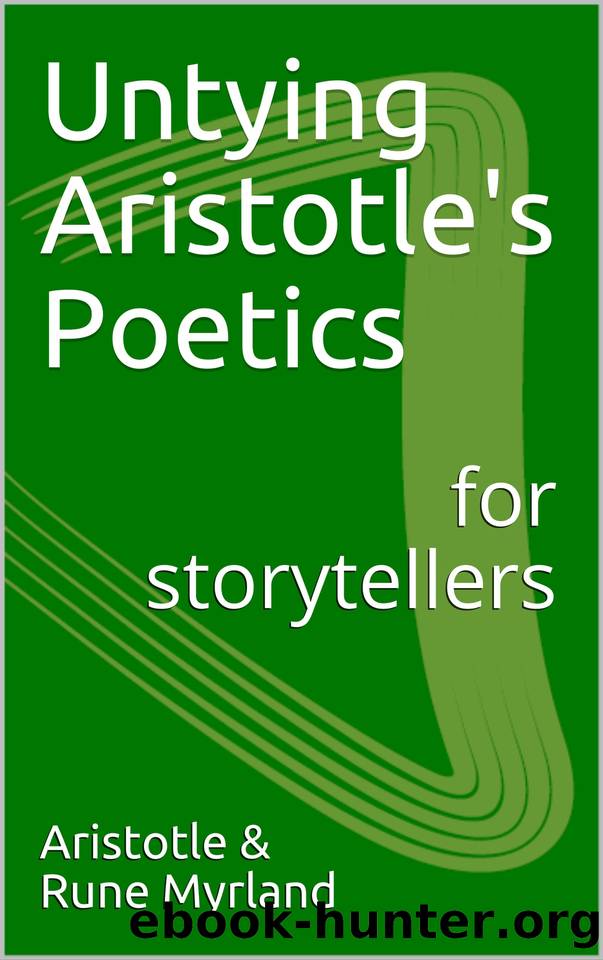Untying Aristotle's Poetics for Storytellers by Aristotle & Myrland Rune

Author:Aristotle & Myrland, Rune [Aristotle]
Language: eng
Format: epub
Publisher: Storyknot
Published: 2018-03-21T16:00:00+00:00
The Cast (in Order of Appearance)
The Wandering Bard
Nine years have passed since the Trojan War ended, and Odysseus has not yet shown up. Most think he is dead. 108 suitors are abusing the hospitality of his manor and demanding that his wife Penelope chooses one of them as her new husband. She delays the decision. Meanwhile, the suitors spend their days feasting, butchering the livestock and eating the hosts to poverty. This is their right, they say, as long as Penelope cannot make up her mind.
The Odyssey is about twelve thousand lines of hexameter verse, eight times the length of a Greek tragedy. It tells the story about the difficult homecoming from the Trojan War for the hero Odysseus.
The plot does not begin in Troy where the journey begins. It begins nine years later at Ithaca, his home, showing it in a state where his return is urgently needed. This is not the chronological beginning. It is what Aristotle calls the beginning of a whole action. Homer starts the Odyssey by setting up the problem that will be solved in the ending.
Stephen Tracy (1997) has noted that Homer often uses ring composition. When Odysseus meets his mother in the underworld, he asks her a number of questions. She replies to them in opposite order. The last first.
Homer does not stop at using ring composition in dialogue. The whole poem is composed in this manner. Instead of creating an episodic structure by giving the characters a series of problems, each solved in turn, he stacks them up. First he poses one problem, then a second, then a third, then a fourth.
When the stack is tall enough, he takes a problem or three off, the last one first. Then he can add a few again, and then he removes a few. But he never removes the one posed in the beginning until the ending. This gives unity to the plot.
Why compose a poem that takes several days to recite in this way?
We do not know. We know very little about Homer. Much of what has been suggested is based on the blind bard Demodocus in the Odyssey . What we have is the Homeric Question , which is really a number of questions. Was the Iliad and Odyssey composed by one, two, or many poets? What role, if any, did writing play in their composition? It has been proven that the poems are indebted to an oral tradition and that some passages are very old, but that is about it.
I imagine Homer as a bard traveling from place to place. In the evenings he plays the lyre and sings his narrative poem in exchange for hospitality and food. He stays in each place a few days before he moves on.
To create an artistic unity or to secure hospitality for a little longer, he sets up a problem on the first night that will be resolved in the last. But he also has a few that are resolved the same night.
However it came to be, Homerâs way of plotting has come down to us as our way.
Download
This site does not store any files on its server. We only index and link to content provided by other sites. Please contact the content providers to delete copyright contents if any and email us, we'll remove relevant links or contents immediately.
The remains of the day by Kazuo Ishiguro(8999)
Tools of Titans by Timothy Ferriss(8396)
Giovanni's Room by James Baldwin(7346)
The Black Swan by Nassim Nicholas Taleb(7129)
Inner Engineering: A Yogi's Guide to Joy by Sadhguru(6794)
The Way of Zen by Alan W. Watts(6614)
The Power of Now: A Guide to Spiritual Enlightenment by Eckhart Tolle(5781)
Asking the Right Questions: A Guide to Critical Thinking by M. Neil Browne & Stuart M. Keeley(5775)
The Six Wives Of Henry VIII (WOMEN IN HISTORY) by Fraser Antonia(5515)
Astrophysics for People in a Hurry by Neil DeGrasse Tyson(5189)
Housekeeping by Marilynne Robinson(4447)
12 Rules for Life by Jordan B. Peterson(4304)
Ikigai by Héctor García & Francesc Miralles(4274)
Double Down (Diary of a Wimpy Kid Book 11) by Jeff Kinney(4272)
The Ethical Slut by Janet W. Hardy(4253)
Skin in the Game by Nassim Nicholas Taleb(4248)
The Art of Happiness by The Dalai Lama(4130)
Skin in the Game: Hidden Asymmetries in Daily Life by Nassim Nicholas Taleb(4006)
Walking by Henry David Thoreau(3962)
